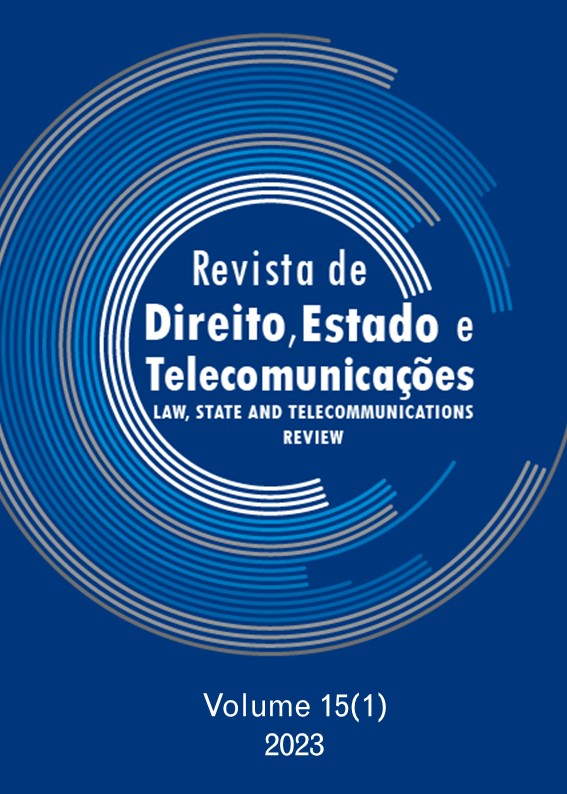Introduction of Artificial Intelligence in the Justice System
International experience
DOI:
https://doi.org/10.26512/lstr.v15i1.43439Keywords:
Legal Science. Judge's Companion System. Court. Machine Civilisation. Computer Logic.Abstract
[Purpose] The purpose of this study is to determine ways to introduce artificial intelligence into the Ukrainian justice system.
[Methodology/Approach/Design] The methodological basis of the study consists of theoretical and specialised legal methods: philosophical approaches, general and special methods of modern legal science, which are to interpret the law, and also general scientific styles.
[Findings] During the study, the features of the use of artificial intelligence in the justice system were established and an analysis of international experience in the use of artificial intelligence in the justice system was conducted, which allowed identifying positive and negative aspects in the practice of other countries. In addition, problems that may hinder the development of artificial intelligence in the justice system of Ukraine and positive trends in the introduction of this innovative communication technology were identified. Based on the identified disadvantages and advantages of using artificial intelligence in justice, it was determined which systems should be implemented in the Ukrainian justice system, in particular the ‘judge's companion’ system. However, it is evident that at the moment artificial intelligence cannot completely replace people.
Downloads
References
Acikgoz, Y., Davison, K.H., Compagnone, M., Laske, M. (2020). Justice perceptions of artificial intelligence in selection. International Journal of Selection and Assessment, 4, 399-416.
AI judges, verdicts via chat app: Brave new world of China`s digital courts. (2019). https://inlnk.ru/3ZxlEj.
Alshevskaya, A.A. (2019). Robot judge will help with consideration of small claims. https://pravo.ru/news/210377/.
Artificial intelligence will be used in Ukrainian courts. (2021). https://cutt.ly/gGE9UJ2.
Code of Judicial Ethics. (2013). https://zakon.rada.gov.ua/rada/show/n0001415-13#Text.
Covelo de Abreu, J. (2019). The role of artificial intelligence in the European e-justice paradigm – suiting effective judicial protection demands. Progress in Artificial Intelligence, 1, 299-308.
Cui, Y., Yan, C., Yan, L. (2019). Artificial Intelligence and Judicial Modernization. Singapore: Springer.
Deeks, A. (2019). The judicial demand for explainable artificial intelligence. Columbia Law Review, 119(7), 1829-1850.
European ethical Charter on the use of Artificial Intelligence in judicial systems and their environment. (2018). https://cutt.ly/RGE9HCa.
Judges now using artificial intelligence to rule on prisoners. (2018). https://learningenglish.voanews.com/a/ai-used-by-judges-to-rule-on-prisoners/4236134.html.
Karmaza, O.O., Koroied, S.O., Makhinchuk, V.M., Strilko, V.Y., Iosypenko, S.T. (2021). Artificial intelligence in justice. Linguistics and Culture Review, 5, 1413-1425.
Malovatsky, O. (2021). The use of artificial intelligence in justice will relieve the courts. https://cutt.ly/qGE9gjo.
Order of the Cabinet of Ministers of Ukraine No. 1556-2020-r "About approval of the Concept of development of artificial intelligence in Ukraine". (2020). https://zakon.rada.gov.ua/laws/show/1556-2020-%D1%80#Text.
Order of the Cabinet of Ministers of Ukraine No. 438-2021-r "On Approval of the Action Plan for the Implementation of the Concept of Artificial Intelligence Development in Ukraine for 2021-2024". (2021). https://zakon.rada.gov.ua/laws/show/438-2021-%D1%80#Text.
Rybikova, G.V. (2020). The use of artificial intelligence in justice: Foreign experience. In: Proceedings of the III International Youth Scientific Legal Forum (pp. 281-283). Ternopil: Vector.
Rykov, V.V. (2020). Artificial intelligence to help justice: Respect for human rights. https://inlnk.ru/yONPM4.
Santoni de Sio, F., Almeida, T., van den Hoven, J. (2021). The future of work: freedom, justice and capital in the age of artificial intelligence. Critical Review of International Social and Political Philosophy, 25(1), 1-25.
Shemshuchenko, Yu. (2020). Artificial Intelligence in Justice. https://cedem.org.ua/analytics/shtuchnyj-intelekt-pravosuddia/.
State of Wisconsin v. Loomis (2016). https://www.courts.ca.gov/documents/BTB24-2L-3.pdf.
The GRP is Initiating the Launch of a Pilot Project on the Use of Artificial Intelligence on the Basis of the Court of First Instance. (2021). https://hcj.gov.ua/news/vrp-iniciyuye-zapusk-pilotnogo-proyektu-shchodo-zastosuvannya-shtuchnogo-intelektu-na-bazi-sudu.
Zuryan, V. (2021). Urgent problems and prospects for the development of electronic justice in Ukraine. Bulletin of the Penitentiary Association of Ukraine, 4, 173-181.
Downloads
Published
How to Cite
Issue
Section
License
Copyright (c) 2023 Law, State and Telecommunications Review

This work is licensed under a Creative Commons Attribution 4.0 International License.
By submitting this paper to the Law, State and Telecommunications Review,
I hereby declare that I agree to the terms of the Creative Commons Attribution 4.0 International (CC BY 4.0).


